- Home
- Mary Downing Hahn
Took: A Ghost Story
Took: A Ghost Story Read online
Contents
* * *
Title Page
Contents
Copyright
The Beginning
One
Arrival
Two
Three
Four
Five
The Dolly
Six
The Secret
Seven
Eight
The Taking
Nine
Ten
Eleven
In Auntie’s Cabin
Twelve
Thirteen
In Auntie’s Cabin Again
Fourteen
Fifteen
Sixteen
Seventeen
Eighteen
Nineteen
Twenty
Summer, Two Years Later
About the Author
Clarion Books
215 Park Avenue South,
New York, New York 10003
Copyright © 2015 by Mary Downing Hahn
All rights reserved.
For information about permission to reproduce selections from this book, write to Permissions, Houghton Mifflin Harcourt Publishing Company, 215 Park Avenue South, New York, New York 10003.
Clarion Books is an imprint of Houghton Mifflin Harcourt Publishing Company.
Cover photograph © 2015 by Jarno Sarén/arcangel.com
Cover design by Christine Kettner
www.hmhco.com
THE LIBRARY OF CONGRESS HAS CATALOGED THE PRINT EDITION AS FOLLOWS:
Hahn, Mary Downing.
Took : a ghost story / Mary Downing Hahn.
pages cm
Summary: “A witch called Old Auntie is lurking near Dan’s family’s new home. He doesn’t believe in her at first, but is forced to accept that she is real and take action when his little sister, Erica, is ‘took’ to become Auntie’s slave for the next fifty years”—Provided by publisher.
ISBN 978-0-544-55153-4 (hardcover)
[1. Witches—Fiction. 2. Horror stories.] I. Title.
PZ7.H1256To 2015
Fic]—dc23
2014043064
eISBN 978-0-544-55368-2
v1.0915
The Beginning
The old woman stands on the hilltop, just on the edge of the woods, well hidden from the farmhouse below. Two men and a woman are getting out of a car that has a sign for Jack Lingo Realty painted on the side. The old woman has seen plenty of Realtors in her time. She doesn’t know this one, but she remembers his pa, old Jack Lingo, and his pa, Edward, and the one afore him, back and back through the years to the first Lingo ever to settle in this valley and take up the buying and selling of houses.
Though young Lingo doesn’t know it, Auntie is helping him sell that house to the man and the woman in the only way she knows—muttering and humming and moving her hands this way and that way, weaving spells in the air, sending messages as she’s always done. Messages that make folks need things not worth needing. Dangerous things. Things they regret getting.
You might wonder why Auntie wants this man and woman to buy the house. Truth to tell, she doesn’t give a hoot about them. They’re ignorant fools, but they have something she wants, and she aims to get it. It’s almost time for the change, and they’ve come on schedule, just as she’d known they would.
“New for old,” she chants to herself. “Strong for weak, healthy for sickly, pretty for ugly.”
When the man and the woman follow young Lingo into the old Estes house, Auntie sways back and forth, grinning and rubbing her dry, bony hands together. Her skirt blows in the wind, and long strands of white hair whip around her face. With a little hop and a jig, she turns to something hidden in the trees behind her. “Won’t be long now, my boy. We’ll get rid of the old pet and get us a new one to raise up.”
Though he stays out of sight, her companion makes a noise like a hog when it’s hungry—a squealing sort of snort that might be a laugh, or it might be something else altogether.
Auntie gazes down at the rundown farmhouse and outbuildings, the overgrown fields, the woods creeping closer year by year. From the hill, she can see the missing shingles in the roof, the warped boards riddled with termites and dry rot, the cracks in the chimney.
Almost fifty years have passed since the Estes family left the place. Nobody has lived there since then. Local folk avoid the place. They scare their children with stories about the girl, the one before her, and the one before her, back and back to the very first girl. Fear keeps them out of the woods and away from the cabin on Brewster’s Hill. Those children know all about Auntie and her companion.
But newcomers always show up, city people who’ve never heard the stories. If the valley folk try to warn them, they scoff and laugh and call the stories superstitious nonsense. They come from places where lights burn all night. They don’t heed the dark and what hides there.
It all works to Auntie’s advantage.
Down below, a door opens, and Auntie watches young Lingo lead the man and woman outside. Even though they speak softly, Auntie hears every word. They aim to buy that tumbledown wreck of a house, fix it up, and live there with their children, a boy and a girl, they tell him. It’s just what they want—a chance to get away from their old life and start anew in the country. They’ll get some chickens, they say, a couple of goats, maybe even a cow or a sheep. They’ll plant a garden, grow their own food.
The man and the woman get into the Realtor’s car, laughing, excited. Auntie spits into the dirt. Fools. They’ll find out soon enough.
She listens to the car’s engine until she can’t hear it anymore. Then she snaps her fingers and does another jig. “It’s falling into place just like I predicted, dear boy, but don’t you say a word to her back at the cottage. She ain’t to know till it happens.”
Her companion snorts and squeals, and the two of them disappear into the dark woods.
To wait.
One
It was a long drive from Fairfield, Connecticut, to Woodville, West Virginia—two days, with an overnight stay in Maryland. My sister, Erica, and I were sick of the back seat, sick of each other, and mad at our parents for making us leave our home, our school, and our friends.
Had they asked us how we felt about moving? Of course not. They’ve never been the kind of parents who ask if you want to drink your milk from the red glass or the blue glass. They just hand you a glass, and that’s that. Milk tastes the same whether the glass is blue or red or purple.
Going to West Virginia was a big thing, something we should have had a say in, but no. They left us with a neighbor, drove down there, found a house they liked, and bought it. Just like that.
They were the grownups, the adults, the parents. They were in charge. They made the decisions.
In all fairness, they had a reason for what they did. Dad worked for a big corporation. He earned a big salary. We had a big house, two big cars, and all sorts of other big stuff—expensive stuff. Erica and I went to private school. Mom didn’t work. She was what’s called a soccer mom, driving me and Erica and our friends to games and clubs and the country club pool. She and Dad played golf. They were planning to buy a sailboat.
But then the recession came along, and the big corporation started laying people off. Dad was one of them. He thought he’d find another job fast, but he didn’t. A year went by. One of our big cars was repossessed. Erica and I went to public school. We gave up the country club. There was no more talk about sailboats.
The bank started sending letters. Credit card companies called. Dad and Mom were maxed out financially. The mortgage company threatened foreclosure.
So we had to sell the house. I can understand that. But why did we have to move to West Virginia? It wa
s cheaper to live there, Dad said. Erica and I would love it. So much space—woods and fields and mountains. He took to singing “Country Roads,” an old John Denver song about West Virginia, putting lots of emphasis on “Almost heaven, West Virginia.” He also informed us that the license plates said “Wild, Wonderful.”
So here we were, on an interstate highway, with nothing to see but mountains and woods, wild but not wonderful, in my opinion. It was like being in a foreign country. How would I ever get used to all the nature surrounding us?
Beside me, Erica was talking to the doll Mom had given her—not because it was her birthday or anything, but because she was so unhappy about leaving Fairfield.
That’s rewarding bad behavior, if you ask me. I was just as unhappy as my sister, but since I didn’t cry myself to sleep and mope in my room and refuse to eat, all I got was a pair of binoculars and Peterson’s Field Guide to Birds of North America. Dad thought I might like to identify the birds we were sure to see when we went hiking. Well, maybe I would, but still, that doll was ten times more expensive than my binoculars. It came with a little trunk full of clothes. There were even outfits in my sister’s size so she and the doll could dress alike. It had its own bed, too. And its hair was red just like Erica’s and cut the same way.
All the time we were in the van, Erica talked to the doll. She tried all its clothes on and told the doll how pretty it was. She hugged it and kissed it. She even named it Little Erica.
It was making me sick. But every time I complained, Erica got mad and we started quarreling and Mom turned around and blamed it all on me. “Leave your sister alone, Daniel,” she’d say. “She’s perfectly happy playing with Little Erica. Read a book or something.”
“You know I can’t read in the car. Do you want me to barf all over that stupid doll?”
At last we turned off the interstate. The roads narrowed and ran up and down hills, crossed fields, passed farms, and tunneled through woods. We glimpsed mountains and swift rivers. The towns were farther apart and smaller, some no more than a strip of houses and shops along the road.
By the time Dad finally pulled off an unpaved road and headed down a narrow driveway, the woods around us were dark. In the van’s headlights the trees looked like a stage set lit by spotlights.
The van bounced over ruts and bumps, tossing Erica and me toward and away from each other. “Stay on your side, Daniel,” Erica said, “and stop banging into me and Little Erica. We don’t like it.”
“That doll doesn’t care—she’s not real.”
“She is so!”
“Be quiet, Daniel,” Mom said.
“It’s not my fault,” I said. “Instead of blaming me, tell Dad to slow down.”
Just then we came out of the woods, and I got my first view of the house. It stood in the middle of a field of tall grass—weeds, actually. Even in the dark I could see that the place was a wreck. The porch sagged under the weight of vines growing up the walls and across the roof. Tall, shaggy bushes blocked most of the windows on the first floor. Shutters hung crooked. Some were missing altogether. I was sure it hadn’t been painted for a long time.
Erica was the first to speak. “It’s scary.”
“What’s scary about it?” Dad asked.
“It’s dark.” She hugged her doll tightly. “The woods are scary, too. And there aren’t any other houses.”
“Wait until morning, Erica,” Mom said. “It’s lovely in the daylight. You’ll see.”
“And we have a few neighbors down the road,” Dad added.
How far down the road? I wondered. And what were they like?
Dad and Mom got out of the van and headed toward the house. Erica ran to catch up and slipped her hand into Mom’s. I followed them, breathing in the unfamiliar smell of the woods and listening to night sounds. Wind rattled branches and hissed through the weeds in the field. A shutter banged against the side of the house. An owl called from the woods.
At the same moment, something made the hair on my neck rise. Sure that someone was watching us, I turned around and stared down the dark driveway. I saw no one, but I shivered—and not because I was cold.
Arrival
The old woman stands on the hilltop, at the edge of the woods, well hidden from the farmhouse below, just as she did before, but now it’s a dark, cold night, lit by the moon. All around her, bushes and branches rattle in a wind that carries autumn’s breath. But she isn’t cold. She leans on her staff and peers toward the road.
“They’re coming,” she calls to her companion. He snorts and continues snuffling about in the dead leaves for good things to eat.
Headlights bounce down the driveway. A big car stops by the house. Even in the dark a person can see that it’s a ramshackle wreck of a place, ready to topple with the first strong wind that comes its way.
The car doors open and the interior lights come on. She sees the girl, just the one she needs. The child gets out, clutching a dolly. The old woman sniffs fear. The girl is scared of the dark and the old house. She doesn’t want to live here. Well, she won’t live here long, will she?
The girl’s name is blown by the wind across the dark field and laid at the old woman’s feet. Erica. Air-ric-cah. She likes to draw the name out, especially the last syllable.
“Air-ric-cah, Air-ric-cah,” the old woman whispers. The name glides lightly through the air, a rustle of black silk thread, and winds itself into the girl’s ear.
She sees the girl tense and look around, move closer to her mother.
“Yes,” the old woman hisses. “You’ll do. Air-ric-cah, Air-ric-cah.”
She does one of her little jigs and calls to her companion. “Time to go, dear boy. We’ll see her soon, don’t you worry. She’s the one, she’s ours.”
As the family enters their new home, the old woman and her companion wrap themselves in darkness and make their way home.
Two
While we waited on the porch, Dad fished a big old-fashioned key out of his pocket. With a lot of effort he finally got it to turn in the lock. Moonlight followed us inside and cast our shadows across the dusty floor. In front of us, stairs led to the second story.
Mom flicked a switch, and the shadows fled. To the right was the living room, or maybe the parlor, empty now except for a fireplace. Three tall windows with old-fashioned wavy glass reflected us standing in the hall, slightly distorted, like people in a fun house.
“Where’s our furniture?” Erica asked.
“It’s coming tomorrow,” Mom told her.
“But where are we sleeping?” she asked, sounding a bit tearful.
“Don’t you remember?” Dad asked. “We brought our camping stuff—sleeping bags, foam mats, pillows, blankets.”
“Can I sleep with Mommy?”
“Of course you can.” Mom put her arm around Erica and hugged her.
I was getting pretty tired of Erica’s clinging behavior. “What’s wrong with you?” I whispered. “You never used to act like this.”
“I never had to live in the woods before.” She turned to Mom. “Are we going to eat wild berries?”
“Of course not, sweetie,” Dad said. “Whatever gave you that idea?”
“That’s what happens sometimes in stories.”
“Well, this isn’t a story, Erica,” Mom said.
Dad got an ancient gas stove going, and Mom heated a pot of water. When it boiled, she dumped in noodles and heated a jar of marinara sauce.
We ate our first meal in the house picnic style in front of the fire. Erica snuggled beside Mom and shared her food with Little Erica. The food stuck to the doll’s face, and Erica tenderly wiped her clean with a napkin.
Later, we all crawled into our sleeping bags and watched what was left of the fire fall into ash. The lights were out, and the moon shone in through the tall windows. I heard Erica whispering to the doll.
Sometime during the night I woke up. I’d drunk too much soda at dinner, and now I needed the bathroom. I eased out of my sleeping bag and
got to my feet. Dad snored, Mom slept like a dead woman, and Erica murmured as if she were dreaming.
I tiptoed across the floor and eased the front door open. It was easier to pee outside than find my way upstairs to the bathroom.
The moonlight was brilliant and the stars were clustered thickly over my head, more than I’d ever seen in Fairfield. After I finished what I came out to do, I stood on the porch and gazed at the dark mass of woods bordering the fields. The night was cold, but as I turned to go inside, I was stopped by a sound in the darkness—a howl, which might have been the wind in the trees but was scarier. Much scarier. I shivered and edged toward the door, but before I stepped inside, I looked back. Something moved at the edge of the woods. Its head gleamed in the moonlight, as white as bone. I heard the howl again, louder this time, and stumbled backward, slamming and bolting the door.
“Daniel,” Mom called sleepily, “what are you doing up in the middle of the night?”
“I went outside to pee. Something in the woods howled.” I slid into my sleeping bag, shivering with cold and fear.
“Shh,” she whispered. “You’ll wake up Dad and Erica.”
“Didn’t you hear it?”
She shook her head. “It was probably an owl or a fox.”
“No. I saw it,” I told her. “It was as tall as a man, and its head shone in the moonlight.”
Mom smoothed my hair. “Go back to sleep, Daniel. There’s nothing out there. It’s dark, you’re in a strange place, and your eyes were playing tricks on you.”
I moved a little closer to her. Maybe she was right. She must be right. Monsters didn’t roam the woods anywhere but in fairy tales. I closed my eyes and practiced breathing slowly and deeply, but it was almost daylight by the time I fell asleep.
When I woke up, sunlight filled the living room. Just as Mom had said, whatever I’d heard and seen in the dark had a natural explanation—night noises most likely, animals going about their nocturnal business, embellished with my imagination. Moonlight and shadows play tricks on you.

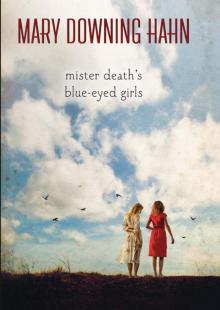 Mister Death's Blue-Eyed Girls
Mister Death's Blue-Eyed Girls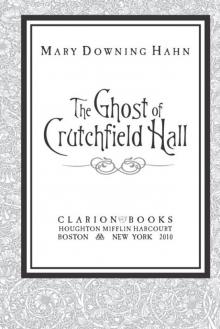 The Ghost of Crutchfield Hall
The Ghost of Crutchfield Hall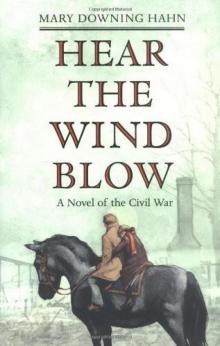 Hear the Wind Blow
Hear the Wind Blow Time of the Witch
Time of the Witch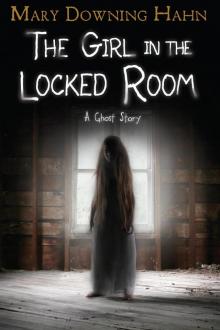 The Girl in the Locked Room: A Ghost Story
The Girl in the Locked Room: A Ghost Story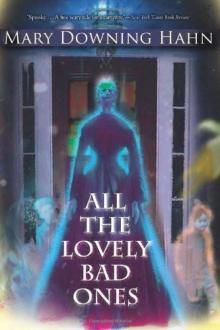 All the Lovely Bad Ones
All the Lovely Bad Ones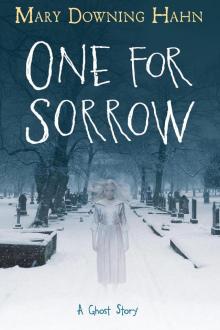 One for Sorrow
One for Sorrow Deep and Dark and Dangerous
Deep and Dark and Dangerous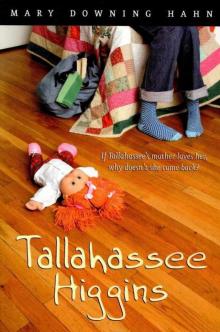 Tallahassee Higgins
Tallahassee Higgins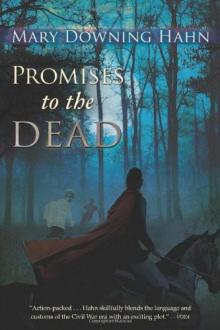 Promises to the Dead
Promises to the Dead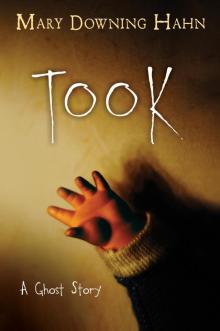 Took: A Ghost Story
Took: A Ghost Story Following My Own Footsteps
Following My Own Footsteps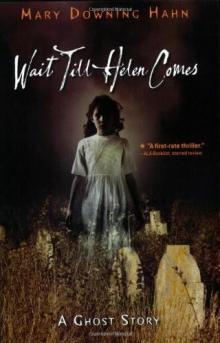 Wait Till Helen Comes: A Ghost Story
Wait Till Helen Comes: A Ghost Story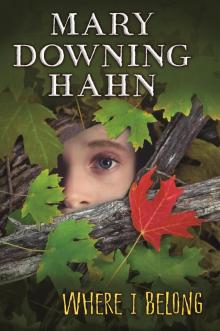 Where I Belong
Where I Belong The Spanish Kidnapping Disaster
The Spanish Kidnapping Disaster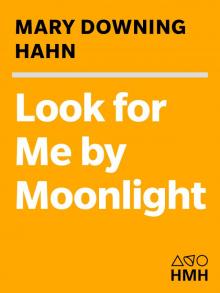 Look for Me by Moonlight
Look for Me by Moonlight The Old Willis Place
The Old Willis Place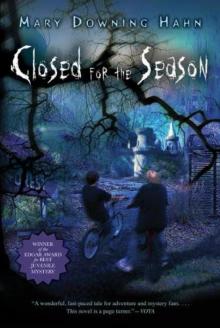 Closed for the Season
Closed for the Season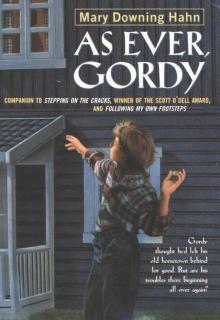 As Ever, Gordy
As Ever, Gordy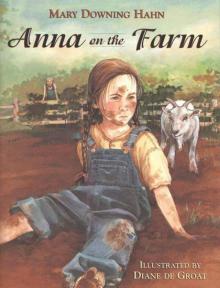 Anna on the Farm
Anna on the Farm The Doll in the Garden
The Doll in the Garden Daphne's Book
Daphne's Book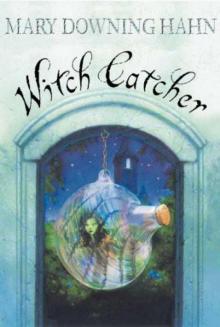 Witch Catcher
Witch Catcher The Gentleman Outlaw and Me--Eli
The Gentleman Outlaw and Me--Eli Wait Till Helen Comes
Wait Till Helen Comes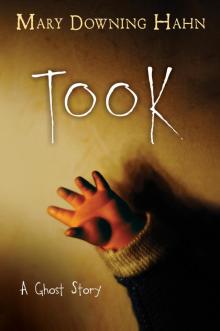 Took
Took A Haunting Collection
A Haunting Collection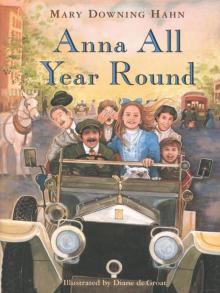 Anna All Year Round
Anna All Year Round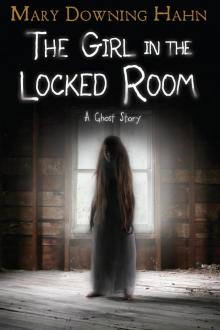 The Girl in the Locked Room
The Girl in the Locked Room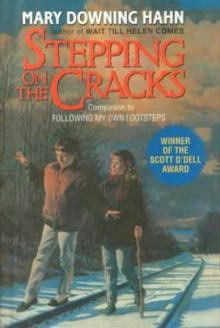 Stepping on the Cracks
Stepping on the Cracks